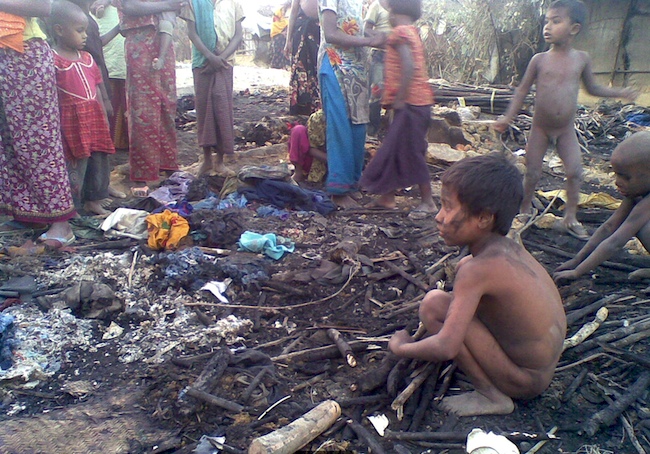 Picture borrowed from Statelessrohingya (cc)
Picture borrowed from Statelessrohingya (cc)
by Ole Chavannes, 15 juni 2013
“I don’t like Muslims. There are too many”, states an old activist and video journalist. He was in prison for 15 years, simply for doing his job. He smiles at me with angry eyes: “This is a Buddhist country!”. We drink whiskey with ice and discuss politics and democracy in the new Burma. Maybe for a bit too long already. So I reply: “Shouldn’t the majority protect the minority in a true democracy?”. He looks surprised, as if he hears it for the first time.
Burma is struggling with its minorities for decades. The state army fights rebel groups in the East, North and West. Wars, in the name of religion or ethnicity, actually about land, money and power. The main challenge for the current president is not even boosting economic reforms and democracy, but to reach peace agreements. He wants to be known as a peacemaker, before the next elections in 2015.
Internationally Burma faces a lot of criticism on the way the Rohingya are being treated. This small ethnic group (about 800.000) in the West, at the border with Bangladesh, has been attacked by wild gangs, slaughtering dozens of people, even mothers and children.
Extreme Buddhists are believed to be behind the brutal violence. Human Rights Watch is warning the ethnic hatred could lead to ‘a second Rwanda’.
I asked many Burmese in the last weeks to explain the Rohingya issue. The answer is always the same: “It is very complicated”. There are religious reasons (they are Muslims, like 3% of the nations population, while over 80% is Buddhist), social-economical reasons (they have a higher birth-rate than the Burmese average) and geo-political reasons (Rohingya also live in Bangladesh where they’re also a minority).
What explains the ‘complexity’ best though, in my humble opinion, is the history. The British colonial rulers used mostly Rohingya to suppress Burma: they got key-positions from the British. A classic trick by colonial powers to divide and rule. Just like the Dutch did with the Maluku in the Dutch Indies (now Indonesia), giving this Christian minority most positions in the colonial army.
The discrimination is even formalized by a law in 1982, that effectively denies Burmese citizenship to most Rohingya. Too many other Burmese see the Rohingya still as ‘traitors’ and (secretly) wish they simply cross the border to Bangladesh (although most of them have been living and working in Burma for many generations).
It seems that with the new freedoms, old frustrations are set free too. The same happened in Indonesia soon after dictator Suharto stepped down in 1997: a bloody war started on the Maluku islands, with lots of Jihadists from Java involved, fighting the Christians. It lasted for 3 years, with lots of victims and no victors. Since 2002, it has been relatively peaceful there. It took Indonesia about a decade to become a true democracy.
